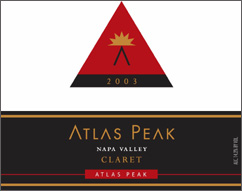

Atlas Peak Vineyards
2003 Claret(Atlas Peak ~ Napa Valley)
Atlas Peak Vineyards – as is the case with the appellation in general – is attempting to throw off the yolk of less-than-stellar Sangiovese it made in the 1980s and ‘90s. With this red blend, APV, with its winemaker Darren Procsal fully engaged, is hereby poised to take its place among the pantheon of world-class producers in the Napa Valley.
What a beautiful wine this 2003 claret is. I tasted it twice in June and July and I think it’s one of the better wines of the vintage to thus far emerge from the valley; and quite possibly the best red wine produced by APV in a very long time.
At the earlier tasting, the wine was big and brooding, but by the time a month had lapsed, the wine was already falling into the “lovely” category. It’s simply beautiful with sweet, warm berry aromas, and deep and voluptuous flavors on a silken texture. The wine is still young but it will continue to mature over the next two decades. I put it up there with a great Bordeaux.
The wine was racked into a combination of new (65%), 2-year, and 3-year-old French oak barrels, where it spent 18 months before bottling. The listed alcohol is 14.2 percent and there were 515 cases produced.
Reviewed September 8, 2006 by Alan Goldfarb.
Other reviewed wines from Atlas Peak Vineyards
|
Atlas Peak Vineyards 2003 Cabernet Sauvignon (Spring Mountain District ~ Napa Valley)Alan Goldfarb 11/22/2006 |
The Wine
Winery: Atlas Peak Vineyards |
The Reviewer Alan Goldfarb
Alan Goldfarb
Alan Goldfarb has been writing about and reviewing wine for 17 years. His reviews have been published in the St. Helena Star, San Jose Mercury, San Francisco Examiner, Decanter, and Wine Enthusiast, among others. Not once has he used a point system, star system, or an iconic symbol to quantify a wine. What counts in Mr. Goldfarb’s criteria when judging a wine is: how it tastes in the glass; is it well-constructed; its food compatibility; and presence of redeeming regional attributes. |










